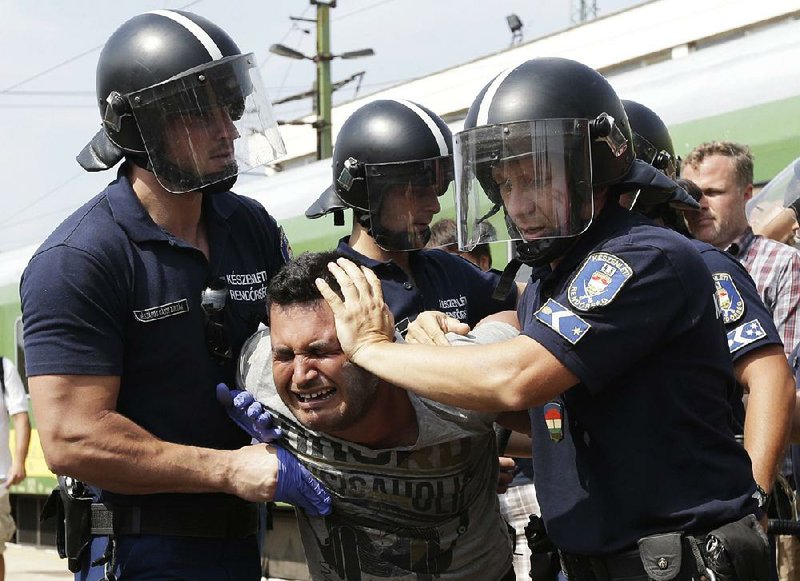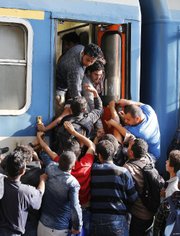BUDAPEST, Hungary -- Thousands of migrants surged into a Budapest train station Thursday when police ended their two-day blockade of its entrance, but the surprise move produced only a new swirl of confusion and anger as some migrants found themselves tricked into taking a train to a Hungarian camp for asylum seekers.
RELATED ARTICLE
http://www.arkansas…">Image of drowned boy strikes chord worldwide
Hungary's leader railed Thursday at Germany and European Union leaders for lacking urgency in dealing with Europe's migrant crisis. Chaos reigned in Budapest, where migrants by the hundreds dashed into the city's main train station after police stopped blocking its entrance despite announcements in Hungarian and English that all services from the station to western Europe had been canceled.
Meanwhile, German Chancellor Angela Merkel said EU-member states have a duty to offer shelter to refugees arriving on their soil, rebuffing Hungarian Prime Minister Viktor Orban, who called it Germany's problem.
As Orban warned European partners that he intends to make his country's borders an impassable fortress for new arrivals, his government struggled to coax thousands of unwanted visitors away from the Budapest transportation hub that has been turned into a refugee camp.
People fleeing war and poverty in the Middle East, Asia and Africa rushed into the Keleti train terminal when police unexpectedly withdrew Thursday morning, ending a blockade designed to stop migrants from boarding trains to their desired destinations in Germany and Austria.
People pushed on one another to reach a train's six carriages. Children caught in the melee cried in terror as parents or older siblings pulled them through open windows, thinking that getting on board meant they would be first to escape Hungary.
But instead of heading to the Austrian border, the overloaded train stopped at Bicske, a city northwest of Budapest that holds one of the country's five camps for asylum seekers -- facilities the migrants want to avoid because they don't want to pursue asylum claims in economically depressed Hungary.
The crowd, angrily waving train tickets to Vienna and Munich, refused police orders to board buses to the asylum center, pushing their way past police and back onto the train. A day-long standoff ensued in which police and charity workers took turns handing food and water to the passengers, only to have them tossed out train windows in protest.
"We don't need food and water. Just let us go to Germany," one man shouted. Children held up handwritten signs reading, "Let's Go Germany."
About 100 police kept watch on the train, barring journalists from the platform, but didn't remove the migrants by force.
The head of police border control, Col. Laszlo Balazs, said 16 people voluntarily checked into the asylum center, while about 500 others refused. He said officers were using loudspeakers to inform those who wouldn't comply of "their legal obligations."
"Nobody can avoid identity checks. Everyone must submit themselves to this measure, and the police are keeping this train in place until they do," he said.
Back at the Budapest train station, announcements in Hungarian and English declared that all services from the station to western Europe had been canceled. A statement in English on the main departures board said no more trains to Austria or Germany would leave "due to safety reasons until further notice."
Conditions at Keleti station have grown increasingly unsanitary despite the efforts of volunteers distributing water, food, medicine and disinfectants. The numbers of those stuck there have swelled since Hungary reversed course Tuesday after allowing more than 2,000 migrants to travel on trains heading west the day before. Thousands were stranded after buying tickets costing $68 to $136.
Hungary's rail company said Thursday that it was refusing to refund the tickets at the station, citing fears that some may be counterfeit. It said ticket-holders must file refund requests in writing and have the reimbursement mailed to them.
Debate in Brussels
The question of how to manage the crisis was hotly debated Thursday in Brussels at meetings with European Union leaders and Hungary's Orban. His chief of staff, Janos Lazar, said 160,000 migrants had reached Hungary this year, 90,000 of them in the past two months alone, representing about half of all asylum seekers in Europe.
"We Hungarians are full of fear," Orban said at a Brussels news conference, warning that the acceptance of so many Muslims from Syria, Iraq, Afghanistan and elsewhere would erode Europe's Christian bedrock.
Orban also said Hungary's dilemma was really "a German problem. Nobody would like to stay in Hungary. All of them would like to go to Germany."
But Serbia's prime minister, Aleksandar Vucic, warned that if Hungary drew a new line in the sand, this would simply create a new problem for Serbia, where virtually none of the migrants passing through want to claim asylum.
Vucic said the EU needed a regionwide plan to ensure migrants received care and support if Hungary sealed its border. "Otherwise ... in 12 days we can face huge problems here."
Germany's Merkel, in a phone call with French President Francois Hollande, also disputed Orban's statements.
"Germany is doing what is morally and legally required of us, no more and no less," Merkel said when asked during a visit to Switzerland on Thursday about Orban's remarks. "That's why this problem concerns all of us in Europe."
Merkel and Hollande agreed that the 28-nation European Union needs binding country-by-country quotas for asylum seekers. Such proposals are rejected by Hungary and other eastern European countries, with Orban on Thursday saying a quota system will just encourage more migrants to head for Europe and that the EU should focus instead on strengthening its borders.
Germany's government plans to present a package of measures, including higher spending on refugees, on Sept. 24.
"We can't disengage from what happens in the world," Merkel said Thursday. "We talk a lot about globalization, and now we're seeing part of what that is."
Orban confirmed his government's plan to send at least 3,000 troops to Hungary's southern border with Serbia, where police patrols, razor-wire coils and a 13-foot fence are already in place to deter new arrivals from the non-EU member.
The premier said he expected lawmakers to debate and pass a package of government measures today that he hopes will strengthen border security with Serbia. The legislation would authorize the troop deployment, create new criminal penalties for those who damage the border fence, stiffen prison sentences for smugglers and create new border asylum-processing centers with an emphasis on quick verdicts, limited appeals and a possible new deportation system to Serbia.
EU President Donald Tusk said Thursday during a news conference with Orban that proposals coming next week must address the EU-wide distribution of at least 100,000 refugees pouring into Hungary, Italy and Greece.
The leaders of Hungary, Slovakia, the Czech Republic and Poland, which reject refugee quotas for individual EU members, will meet today in Prague to coordinate their position in the face of pressure from France and Germany, which are working on joint proposals to present to other European leaders.
"I won't name them, but some countries have refused to take in any refugees, and they must reconsider their position," Hollande said Thursday in Paris. "The system is not working, We need a permanent, binding mechanism."
Meanwhile, U.K. Prime Minister David Cameron faced increasing pressure Thursday to let in more refugees from Syria after British newspapers were dominated by a photograph of a dead child on a Turkish beach.
Cameron, who said "there isn't a solution that's simply about taking people," found himself under attack from lawmakers in his own Conservative Party, religious leaders and the political opposition. The United Kingdom has resettled 216 refugees from Syria under its "vulnerable persons" program, and more than 4,000, some of whom were already living in the U.K., have been granted asylum.
"Anyone who saw those pictures overnight could not help but be moved, and, as a father, I felt deeply moved by the sight of that young boy on a beach in Turkey," Cameron said in a pooled television interview.
"Britain is a moral nation that always fulfills its moral obligations," he said. "We are taking thousands of Syrian refugees and we will continue to do that."
Cameron argued that the best solution would be to bring "peace and stability" to the region.
The interim leader of the main opposition Labor Party, Harriet Harman, urged Cameron to "end the inertia and delay, and show some moral leadership" by agreeing to take more Syrian refugees and convening an urgent meeting of European Union leaders next week.
"We are an outward-facing, generous-hearted nation, not one that turns inward and shirks its responsibilities," Harman wrote in a letter to the prime minister.
Vincent Nichols, head of the Roman Catholic Church in England and Wales, said Britain's and Europe's response is "a disgrace," and the Anglican Archbishop of Canterbury, Justin Welby, urged the government to take in more refugees.
Information for this article was contributed by Shawn Pogatchnik, Pablo Gorondi, Petr Josek, Balint Szlanko, Jovana Gec and Amir Bibawy of The Associated Press and by Patrick Donahue, Zoltan Simon, Gregory Viscusi, Jones Hayden, James G. Neuger, Rainer Buergin, Arne Delfs, Marton Eder, Gabriella Lovas, Thomas Penny and Hannah Murphy of Bloomberg News.
A Section on 09/04/2015


